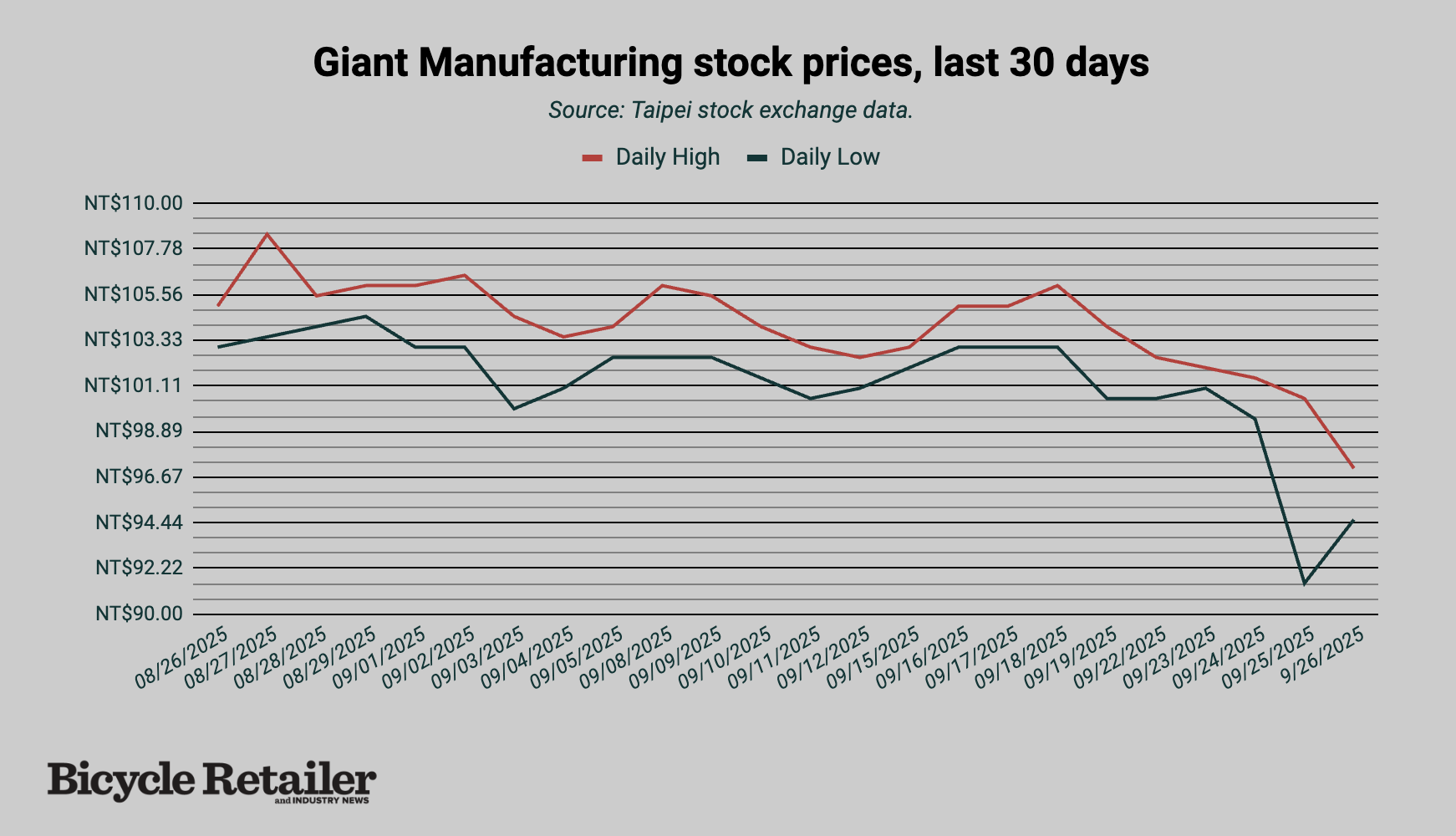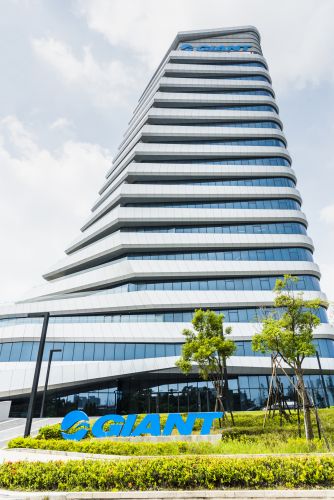TAICHUNG, Taiwan (BRAIN) — Giant Group says U.S. Customs and Border Patrol officials never visited its factories or had any direct contact with the company before announcing Wednesday that it will detain future Giant shipments to the U.S. because of alleged forced labor.
“CBP has never conducted any on-site investigation at Giant Group’s Taiwan manufacturing factory, nor have any of our departments or personnel been contacted by CBP for interviews or inquiries,” Belinda Yeh, a Giant PR specialist, told BRAIN in an email.
Another Giant spokesman, Ken Li, the head of Giant’s global PR and marketing, made similar comments to CNN. “At this stage, we have not yet had direct engagement with them,” Li told CNN.
Yeh also clarified early Friday that no Giant or Giant-made shipments are being held up by CBP. The order refers to any shipments that arrive after the WRO announcement early Wednesday. She said shipments that are currently en route to the U.S. will be returned to their origin.
BRAIN emailed the branch chief of CBP's Media Relations department on Wednesday. On Friday a press officer reached out after reading our story and we have sent them several questions by email.
Meanwhile, the global bike industry is reacting to the WRO with a mixture of suspicion and fear, along with appreciation for the enforcement of labor laws in offshore factories. "I have known Giant for more than 50 years and we have not had a wonderful relationship. But this story really shocks me," one industry CEO said.
In Taiwan, the national Labor Ministry and the mayor of Taichung have pledged to help Giant straighten out the situation, while a labor group said Taiwanese manufacturers need to be educated about international labor expectations.

And Giant’s stock price, which plummeted on the news to a 15-year low briefly on Thursday (Taiwan time), rebounded by the end of the day to close at less than 1% down. The price fell again in early trading on Friday.
Giant says it resolved at least some of the labor concerns raised by the CBP and media reporting, with changes enacted at its factory on January 1 this year. The company is filing a petition with CBP to reverse the WRO.
Origin of the allegations unclear
As one of, if not the, largest bike manufacturers in the world, Giant is an attractive target. But industry members who are familiar with Asian factories said they were surprised to see CBP’s announcement because Giant’s factory and staff are among the most professional in the industry.
“I always thought if something like this (WRO) happened, it would be at a factory in mainland China,” one product manager told BRAIN.
Jay Townley, a U.S. industry consultant, was president of Giant USA in the mid-1990s, and also visited Giant’s Taiwan factories as early as 1980, when he was with Schwinn. He remains an admirer of the company’s Taiwan leadership.
“This is not a third-tier operator. This is top-tier, top-drawer, good talent. They are well-run by smart people. So I have trouble believing that they knowingly broke the law,” Townley said.
In announcing the WRO, CBP said it “receives allegations of forced labor from a variety of sources, including government agencies, media, non-government organizations, and members of the public.” Issuing a WRO — although it’s very rarely done — requires CBP to have “reasonable suspicion” of forced labor.
While Giant said government officials never visited or contacted it before the WRO, Danish journalist Peter Bengtsen reported that he interviewed more than 20 workers from Vietnam and Thailand at Giant’s Taichung factory before producing a summary report of his findings.
Some news sources have erroneously characterized Bengtsen's report as the result of an official Department of Labor investigation, apparently because the report is on the DOL’s website. Bengtsen shared his report through the department’s public submissions site in March. It is the only public submission made to the site since 2022.
Local support
Giant is well known across Taiwan, and local media featured the CBP news on Thursday. The nation’s Ministry of Economic Affairs released a press release Thursday saying it "has always attached great importance to the improvement of labor conditions." The ministry said it would work with Taiwan’s Ministry of Labor to “resolve any potential forced labor concerns, allowing CBP to lift the WRO as soon as possible.”
Lu Shiuyan, the mayor of Taichung, noted in a media availability Thursday that bicycle production is a major industry in Taichung and that manufacturers have been struggling of late with the U.S. tariffs. She said city officials will contact Giant to learn about its issue. Lu Shiuyan also suggested the CBP action stems from ongoing trade negotiations between the U.S. and Taiwan and said she hopes the countries will reach an agreement soon to prevent further disruptions to the nation’s exporters.
Taiwan Labor Front, an activist group, released a statement that noted the CBP action was the first time a Taiwanese company had been accused of using forced labor by the U.S. government. The group said manufacturers need to be educated about international labor expectations, which are not always the same as local laws. For example, Taiwan is one of the few countries that allows labor brokers to charge migrant workers monthly service fees, often deducted from paychecks by the employer.
"Taiwanese companies generally lack awareness of human rights risks, particularly regarding the internationally recognized issue of forced labor. This not only fails to meet the expectations of European and American legislative trends, but also risks being gradually excluded from the international market,” the group said.
Impact debated, future tense noted
Giant's Belinda Yeh clarified to BRAIN on Friday that as far as Giant knows, CBP has so far detained no shipments of Giant-made products. A press release that CBP released early Wednesday said that "effective immediately CBP will detain bicycles, bicycle parts, and accessories manufactured in Taiwan by Giant" (emphasis added).
Yeh said, "Based on our latest understanding as of September 26, there are currently no shipments — whether Own Brand or Original Equipment — from Giant Group’s Taiwan manufacturing factory being held at U.S. Customs."
Nevertheless, any shipments Giant had planned to send from Taiwan to the U.S. will not be released until the situation is resolved. The situation is surely a major issue for Giant, which released a statement on the CBP action just before 2 a.m. Thursday, Taiwan time.
"In the short term, some shipments to the U.S. may experience delays or inspections. However, the company has activated contingency measures and is planning to work closely with CBP and are working closely with business partners to minimize the impact," the company said.
Some fear the news will harm the reputation of Giant, its OE customers, and even all Taiwanese manufacturers. But others say that U.S. consumers have short memories and are willing to overlook reports of labor violations in the sneaker and electronics industries, for example.
"Out of sight, out of mind. Nike is doing just A-OK ..." one retailer said. (Nike has been accused by advocates and media reports of using forced labor in China and elsewhere, which it denies. A U.S. House committee also questioned Nike and other brands about their alleged use of Uyghur labor in China. But the company's imports have never been stopped by U.S. officials over forced-labor allegations.)
A larger concern is that this is the first step by the Trump administration to curtail imports in this industry and others by using labor laws. Besides Giant, the summary report Bengtsen shared with the Department of Labor in March includes information about labor conditions at the Merida and Maxxis factories in Taiwan, as well as factories in other industries.
"It makes me wonder if the administration is just trying to make it difficult to import," said Townley. "It scared people. I mean, this is the U.S. federal government doing what it's never really, in my memory, done before. I think the biggest problem this creates is uncertainty. There's already a lot of uncertainty, and this just adds to it," Townley said.
Giant Manufacturing stock quote on Marketwatch.




